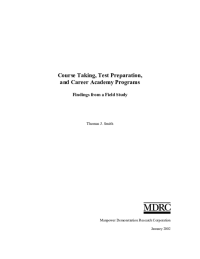Course Taking, Test Preparation, and Career Academy Programs
Findings from a Field Study
One of the nation's most widely adopted school reform initiatives designed to help smoothe students' transitions to careers and to postsecondary education, Career Academies operate as "schools within a school." In collaboration with local employers, the Academies develop college preparatory curricula with a career-oriented theme and aim to provide Academy students a coherent and distinctive educational experience. Yet Academies must also reckon with the realities of the larger educational environment of which they are a part — including the need to meet district and state curriculum prerequisites for graduation and to have students take, and pass, the high-stakes standardized tests that purport to measure educational progress. Based on interviews with school administrators, counselors, Academy coordinators, teachers and students, this paper investigates how course selection is monitored and test preparation is managed for students registered in Academy programs. It delves into the interactions between — and, at times, conflicting goals of — the Academies and the larger school communities of which they are a part as scheduling and test preparation choices are made. And it recommends how Academies can better achieve their unique program objectives while also adapting to externally imposed requirements.






